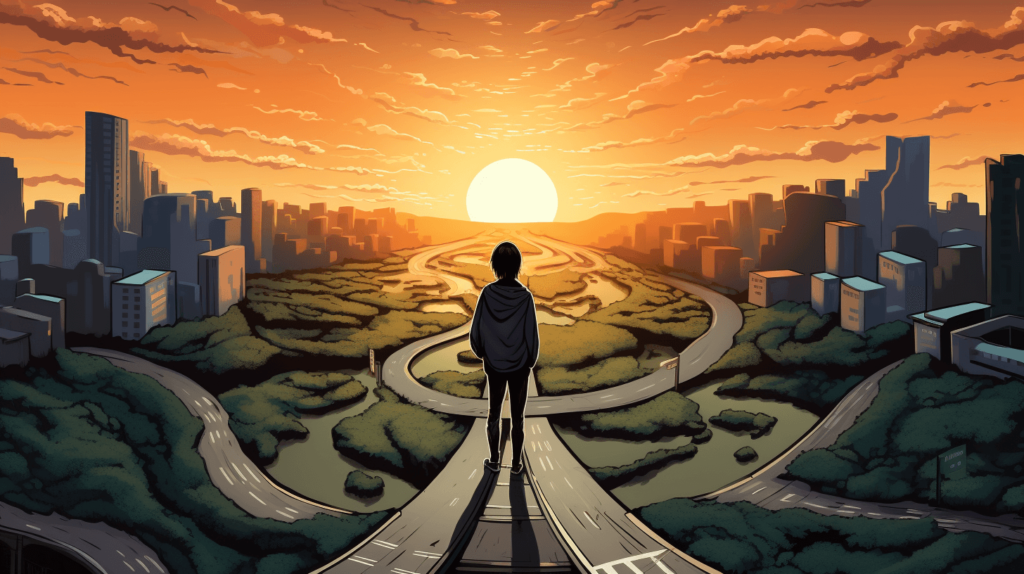Science
The Monk Who Saw the Future: Did an 11th-Century Benedictine Beat Astronomers?
17 February 2026

Ever since Generation Z – people born at the turn of the 20th and 21st centuries – entered the labor market, they have been subjected to special observation and hundreds of in-depth analyses have been drawn up on varying aspects of their lives. One of the reasons was that these – still young – people grew up in a completely digital society. However, even though they spent less time in the “real” world than their predecessors, they don’t seem out of touch with reality at all. They are more willing to compromise than previous, rebellious, generations. But are they really? Won’t they surprise us in the future?
It is commonly assumed that Generation Z includes people born between 1995–2012 (some move the first date back by several years). It is called the internet generation as they have matured with the development of the worldwide web and do not know any other reality. Another term for this group is Generation C (connect, communicate, change).
Sociologists – with the reservation that this generation is still poorly recognized – are looking for its distinguishing features. Aside from gaining knowledge, entertainment and making friends online, they describe this group as relatively open-minded, direct, curious about the world, fond of traveling, and susceptible to change. At the same time, they are demanding – they expect a lot not only from parents or relatives but also from the authorities or employers. As for social skills, opinions are divided. Many researchers claim that the “Zs” are difficult to work with, which is the result of “living in a digital world,” and they also lack regularity and patience.
Generation Z is often compared to the earlier Generation Y, called Millennials, which includes people born roughly between 1980 and 1995. “Ys” can be described as a light version of “Zs.” Tech-savvy, but not as proficient as their younger colleagues, self-confident, but… with limitations, discerning diversity but still appreciating traditional values, sensitive to social problems (e.g. responsibility of business or environmental issues), but… far from radicalism, well-educated, but still filling in the gaps. Differences are also visible: “Ys” are more multi-tasking, optimistic and engaged in work or other undertaken activities.
More serious intergenerational differences are revealed in the juxtaposition of “Zs” with the generation of their parents. The so-called Generation X, that is, people born in the years 1965–80 were skeptics, but at the same time they contested the existing reality, they rebelled. They willingly rejected imposed authorities – the external expression of this attitude was abnegation, as well as a nonchalant style and way of life. They did not want to participate in the rat race, they rejected consumerism.
In retrospect, even greater rebels than the “Xs” were the generation of “baby boomers” who preceded them (born after the war until about 1965). They belonged to the largest baby boom of the 20th century. They grew up in a world dominated by a patriarchal and hierarchical model of life, the cult of work was widespread, and life stability was a very desirable value. Boomers rebelled radically and… consistently – this process is perfectly illustrated by, for example, the film The Graduate by Mike Nichols from 1967, with Dustin Hoffman playing the lead role.
This generation led to the largest and most important mass youth protests in the 20th century, in 1968. Interestingly, students from all over the world were demonstrating under libertarian slogans – from Paris to Warsaw and Prague, from Mexico and the USA to the Federal Republic of Germany. Thanks to Boomers we had hippie counterculture, a sexual revolution, and a golden era of rock’n’roll. By the way, it turned out that this is probably the first generation in the history of the world to live to a grand old age in such a large number.

The phenomenon of the next generation’s opposition to the world “arranged” by their parents and grandparents has been the subject of research of sociologists, psychologists, historians, economists and other scientists for years. In his book The Culture of Growth, the American economic historian Joel Mokyr explains the acceleration of economic growth in the 19th century by the “spirit of rebellion” that matured in northern Europe in the 16th and 17th centuries, and which created the conditions for the development of innovation.
Previously, it was widely believed that it was necessary to rely on the knowledge that the older and more experienced passed on to the youth. Newton and Galileo began to pose bold questions about what they had been taught, laying the groundwork for an Enlightenment breakthrough. They were the rebels of their era, breaking the dominant orthodoxy, risking the opinion of heretics and even being thrown into prison. These changes were fostered by religious and political divisions: Scholars whose views were not accepted in one country moved elsewhere, under the wings of another ruler. Lack of unity meant lower control levels and greater freedom.
In this way, Mokyr explains the fact that the competitive conditions of scientific work – e.g. in the UK and later also in the United States – were conducive to civilizational and economic development and created conditions for the industrial revolution. At that time, Southern Europe, which was religiously homogeneous, as well as China, was at a standstill. Mokyr argues that to create an environment in which new ideas and inventions are quickly replaced by even better ideas and inventions a so-called culture of rebelliousness is needed.
Looking at the typical behavior of the representatives of Generation Z, it is difficult to see in them the seedbed of an upcoming rebellion. On the contrary, “Zs” do not rebel against parents – the research conducted from June to August 2022 on Poles aged 16 to 24 by the MediaHub agency confirms it. As many as 70% of young people have a good relationship with their parents and 61% feel understood by them. So here, where one could expect a generational conflict between the mature working class and the young idealists, there is… sincere gratitude. “Zs” also admit that they appreciate the effort and dedication their parents put into their upbringing.
We recommend:
Further results of the research confirm the agreeableness and even compliance of today’s youth. They are not particularly spontaneous and precisely plan their future – 63% admit that they prefer to act deliberately rather than lead a nonchalant life “overnight.”
The “Zs” are mostly realists and even pessimists. They are aware of the seriousness of the problems surrounding them, whereby 56% of them admit that the huge number of social issues to be solved and the goals to be supported overwhelm them. It should be pointed out that Generation Zs entering into adulthood was marked by exceptional global crises, with the declaration of a pandemic, Russia’s aggression against Ukraine and high inflation at the forefront.
Young people are therefore burdened with a serious dilemma: On the one hand, 72% of them would like to live in a better world, and on the other hand, only 22% are ready for social activity (they admit that action is the natural part that defines who they are). The same percent – less than a quarter of the “Zs” is ready to participate in protests, i.e. to rebel! If such a question were asked to “Boomers”, “Xs”, and even the already reserved “Ys” – the answers would probably be quite different.
It seems that the lack of such a tendency usually attributed to young people to oppose and contest the existing world has many reasons. Except for the aforementioned crisis experiences, which have resulted, among others, in isolation and disruption of social ties during the pandemic, there were also other factors. Generation Z was largely brought up in a stress-free way, often in broken families, where there was no need to fight for more freedom. The children, cherished separately by both parents, ruthlessly took advantage of their weaknesses and gained the freedom of choice unattainable by previous generations. In any case, traditional and conservative values in their parents’ generation were in deep retreat, whereas concepts such as “partnership,” “support” and “equality” reigned.
The point is not to discredit these positive values, but in recent decades they have taken on a caricatural form. This was reflected in the journalism devoted to Generation Z: “Are our children the biggest farts in the world?”, “Hedonists, materialists, egoists – this is the young generation of the millennium”, “I am 40 years old and I am terrified by what I see – Millennials are bad workers and parents” – shouted the headlines of the papers about the young generation from a few years ago. An American journalist Joel Stein, being from Generation X himself, in the pages of Time magazine called people entering adulthood the “Me Me Me Generation.”
The atomization of social life, associated with broken families and resulting in the growing loneliness of “Zs,” went together with the great ease of meeting material needs, the simplicity of networking on the internet and, consequently, the lack of the dream world on which the aspirations of previous generations were based. After all, what is there to dream about when most of the goods are practically within reach?
Unflattering opinions about Generation Z met with the opposite views or, more often, those that pointed to the duality of young people’s behavior. As the above mentioned research has shown, for nearly two-thirds of them, environmental issues are the biggest problem we have to face today. On the other hand, the “Zs” do not allow themselves to be persuaded that the main responsibility lies with them – they blame international corporations and rich countries.
The majority point to the necessity to change their eating habits, but at the same time, only 5% maintain a vegetarian diet. Admittedly, as many as 93% declare that they buy, among others, clothes in second-hand stores, but the motive for their actions is mostly the price (72%) and not ecology (23%).
Perhaps the most evident is the duality of the attitudes of the “Zs” when it comes to the question of self-confidence. Less than half declare a strong belief in their abilities, and 45% doubt their worth and look for their way. Self-belief is more often manifested by men, who, as a rule, take up work faster and achieve their goals. Women devote more time to education and look for their development path longer.
Generation Z is most likely just… what it appears to be to individual researchers. Sociologists from the right emphasize conservatism and fostering family values, researchers from the left willingly refer to pro-ecological attitudes and care for the environment. But what is Generation Z really like? It is still unknown. And young people, often not fully mature, certainly do not know themselves.

Translation: Marcin Brański
Science
17 February 2026



Zmień tryb na ciemny